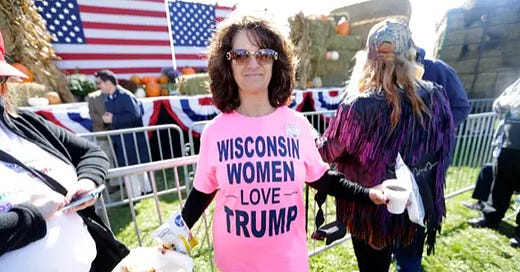LONDON—In 2012, 2016, and 2020, I wrote a few pieces for the London Review of Books on US presidential politics. I reported from the Republican convention in Tampa and the Democratic convention in Charlotte in 2012. I did the same in Cleveland and Philadelphia in 2016 after a trip to New Hampshire during primary season. The 2020 conventions were virtual affairs, so I wrote on Biden without leaving my desk in Brooklyn. This year we discussed sending me back on the campaign trail, but at first I wasn’t interested if what we were going to see was a rematch between Biden and Trump. But later this spring, the editors asked me to write on Biden, and I’d just finished a long essay (out tomorrow) about literary sociology and wanted to work on anything else, so I reviewed three histories of his presidency so far. The result is in the new issue of the LRB. I’ll be reporting for the paper from the Democratic convention in Chicago in August.
In the autumn of 2016, I went to Wisconsin to cover Fall Fest, a rally former House Speaker Paul Ryan held annually. Trump was invited that year, but his invitation was scotched by that week’s scandal. Visiting Wisconsin and meeting with various people in Milwaukee, I became interested in the state’s politics, and submitted a draft of more than 8000 words covering the rally but also the state of affairs in Wisconsin and a hearing at City Hall on Milwaukee’s annual budget. My editors weren’t so interested in local politics, I wasn’t quite finished with what I wanted to say, and so in the end the piece was scaled back to a 2500-word Diary on the rally.
This week I’ve been in touch with some contacts in Milwaukee and a few colleagues who are reporting on the Republican convention for the LRB and other magazines. I had the occasion to look back at the draft of the 2016 Diary from Wisconsin. It is below, unedited, without an ending, and including the full text of some correspondence between me and one of the rally attendees. If I had finished off this version of the piece, I would have probably described watching the World Series finale with the alderman and the defense attorney, a lifelong fan of the Chicago Cubs, who won that year after a long drought. As is obvious from the first sentence, I do not possess the ability to predict the future.
***
October was a grotesque month in American politics, but the possibility that Donald Trump might be elected president seemed to diminish. More and more the vote was reframed as a national mandate on his personal behaviour. Before the first debate polls had tightened, and Trump had appeared to recover from his Islamophobic feuding with the gold-star Khan family, whose son had died in Iraq and who at the Democratic National Convention had invited Trump to read the Constitution before banning Muslims from entering America. It was said that during the first 20 minutes of the first debate between Trump and Hillary Clinton that Trump had hammered her on trade, repeatedly invoking Pennsylvania, Ohio, and Michigan, swing states where industrial jobs had been lost to Mexico and China. Automation never figures in his narrative of the decline of manly US manufacturing, nor does the massive shift to service-sector employment. Whether or not his opening salvos about trade were valid, during the last two thirds of the debate he faltered as a television performer while Clinton retained her dull technocratic composure and goaded Trump into sounding like a crybaby by mentioning Alicia Machado, the Venezuelan 1996 Miss Universe winner whom Trump, owner of the contest, had called ‘Miss Piggy’ and ‘Miss Housekeeping’ in the year after her victory. Machado had since become a US citizen and would be voting against Trump in revenge for his insults.


